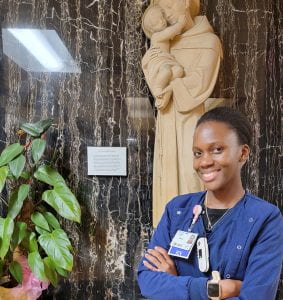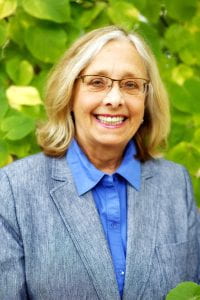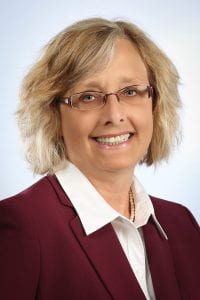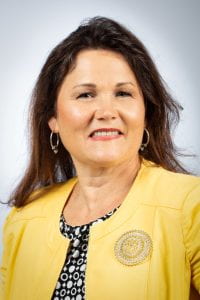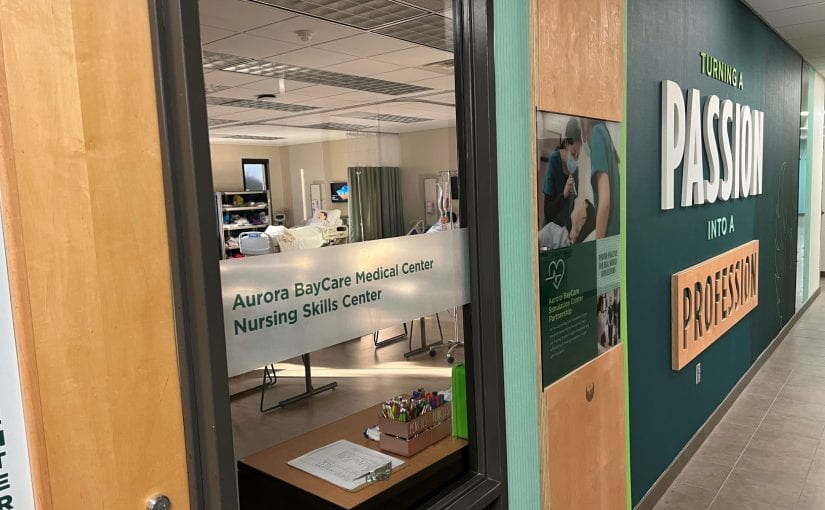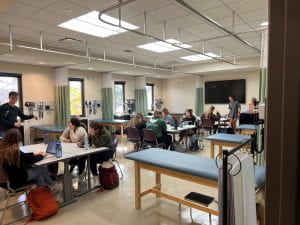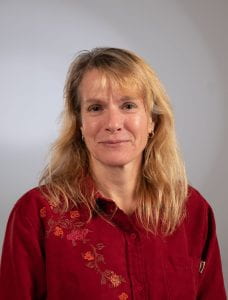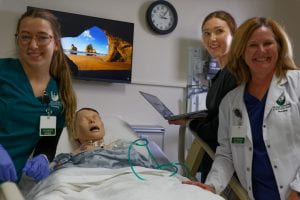
Sylvia “Mimi” Kubsch, Lorraine Noll and Harriet Wichowski were mentors to many nursing students, including an ambitious Sharon Gajeski who came to the University of Wisconsin-Green Bay in the 1980s for its newly launched BSN Completion Program.
Kubsch, Noll and Wichowski were trail blazers as the passionate faculty who created the completion program when there was no other like it in the state.
Gajeski would eventually become colleagues with her mentors, and now, is preparing to retire from UW-Green Bay as a member of the nursing faculty who launched the newest nursing degree program, a traditional, four-year Bachelor of Science in Nursing (BSN).
“It’s just exciting, thinking back to 2018 when we started planning those first classes, and then in 2021, teaching during the (Covid-19) pandemic, and to see the first class graduate,” says Gajeski, RN, MSN and assistant teaching professor. “I’m grateful I was here during this time and had the opportunity to be part of something so successful for the University, and for the area to have another nursing program.”
Kubsch, Noll and Wichowski’s energy and commitment to teaching lit a fire in Gajeski, who soon set herself on a path to becoming an educator, too.
“I always, always had a love for learning and education,” she says. “I enjoy seeing that light bulb moment in students — seeing their growth in a clinical setting from that very first time when they’re nervous and are asking me to come into (the patient’s) room with them, and being able to guide them through that. I love sharing that experience. We’ve all been there.”
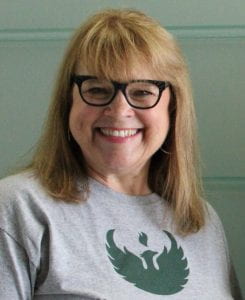
Nursing advisor Ruth Pearson describes Gajeski as passionate and dedicated to students. “Sharon has impacted each nursing program offered at UW-Green Bay — most noteworthy is her involvement with BSN, both in development and teaching. She truly embraces our mission — together we inspire students and transform communities.”
A Green Bay native, Gajeski enrolled at Bellin College in 1980. She completed her general education classes at UW-Green Bay to complete an associate degree in nursing (ADN) and nursing courses at Bellin. As she began her first nursing job in orthopedics and neurology for Bellin Hospital, she also started classes in the BSN Completion Program at UW-Green Bay.
Like many young nurses, even today, Gajeski worked at the hospital nights and weekends and took classes part-time. “The great thing about that program is that (the faculty) helped us apply the learning right while we were working. Tying that all together made it so real — they helped us realize the difference it could make in our careers and our practice,” says Gajeski.
While working as a staff nurse at Bellin, Gajeski became a clinical educator and precepted student nurses. That’s when she fell in love with teaching. Gajeski completed a Master’s of Science in Nursing, education emphasis, at UW-Oshkosh. This led to a teaching position at Bellin College — her first experience working as a colleague alongside faculty who had been her teachers.
Experiences working on quality improvement projects at the hospital led to more opportunities, including achieving certification for quality improvement and presenting her research of medication errors at a national conference.
In 2007, Gajeski returned — again — to UW-Green Bay, this time as a nursing advisor before shifting to her current role as assistant teaching professor.
“It has been a highlight of my career to be a part of the (BSN) curriculum design and new program launch. This was from the ground up,” she says. “Right now, we’re watching as the first class takes their licensing tests and we get as excited as they do when they share the news that they passed.
“I feel blessed that I have had the opportunity to cross paths with so many students and nurses over the years.”

